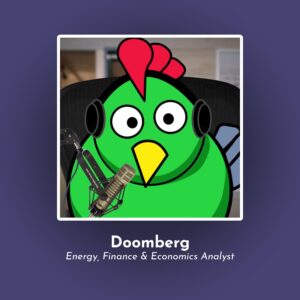
Show Summary
On this episode, Nate is joined by Doomberg – the anonymous energy/finance analyst team (visually presenting as a talking chicken icon) who uses an energy lens to analyze global trends in the economy, with so far some remarkable accuracy. In this wide ranging discussion, Doomberg and Nate cover the interactions between geopolitics, debt, climate policy, and – of course – energy. How have the narratives created around different types of energy – from renewables to nuclear – affected current policy making around the world? Will the increasingly precarious state of the global debt and monetary system shift the geopolitical landscape? How have increasing global tensions combined with a rise in green energy policy affected nations’ desire for energy security – and what does it mean for future policy as we enter a period of decreasing energy availability?
About Doomberg
In May of 2021, Doomberg was started by a team of professionals experienced in heavy industry, private equity, and the hard sciences to highlight the fundamentals missing from many economic and policy decisions, and it quickly grew to be one of the most widely read finance newsletters on Substack. Doomberg covers topics from energy, finance, to the economy at large, in an attempt to improve society’s thinking and clarity to complex problems.
In French, we have a motto that says that a simple drawing is often better than a long explanation. Jean-Marc Jancovici Carbone 4 President
That’s very understandable because with left atmosphere thinking, one of the problems is that you see everything as a series of problems that must have solutions. Iain McGilchrist Neuroscientist and Philosopher
We can’t have hundreds and hundreds of real relationships that are healthy because that requires time and effort and full attention and awareness of being in real relationship and conversation with the other human. Nate Hagens Director of ISEOF
This is the crux of the whole problem. Individual parts of nature are more valuable than the biocomplexity of nature. Thomas Crowther Founder Restor
Show Notes & Links to Learn More
Download transcript00:00 – Doomberg Substack
02:53 – Era of energy abundance
05:16 – We need energy for everything in the economy
07:16 – Ukraine/Russia/NATO Situation
08:20 – How European energy policy led to energy vulnerability
10:33 – Russia has 22% of oil exports and 24% of natural gas exports that are available for purchase (Analysis by ISEOF)
14:40 – Risk of a hot war with China
16:10 – Winter of 23/24 projections in Europe – El Niño
19:33 – Renewables cannot support our current growing 19TW economy
20:52 – Cheat Codes
21:00 – Ontario Green Energy Act and recent move to nuclear
24:41 – Climate Change concern is a privilege of the rich
26:30 – Jevons Paradox
28:17 – Entropy
29:03 – Malthus
35:40 – Degrowth
38:41 – Streisand Effect
39:41 – Peak Oil – Currently estimated at Nov. 2018
39:45 – Permian basin
40:17 – Exxon claim to double extraction ability from Permian
40:43 – Limitations on current Fracking access
42:37 – Fischer-Tropsch and LNG
43:47 – EROI – Nate’s Frankly on EROI
44:16 – EROI for nuclear
44:32 – Small Modular Reactor
44:51 – Industrial Grade Steam emits more carbon than our passenger vehicle and aviation emissions
46:08 – 20% of our current energy is electric
47:08 – Hydrogen Combustion Engine
59:09 – Likelihood of a meltdown with new nuclear technology
54:10 – NRDC nuclear plant requirements to automatically shut off in absence of humans
54:35 – Earth heals from radiation
55:33 – Canada Nuclear expansion 50 years ago
58:02 – Debt Jubilee
58:42 – US Dollar Hegemony
59:51 – Debanking
1:01:19 – Weimar Republic
1:03:21 – US produces 90% of its own energy
1:04:40 – Got Milk?
1:09:32 – Central Bank Digital Currencies
1:10:15 – The End of Money
1:14:40 – Wealthiest counties in the country surround Washington DC
1:15:12 – Luke Gromen
1:18:58 – A full EV has enough rare earth metals for ~30 hybrids
1:25:00 – Volkswagen Ontario Plant
1:27:17 – Ecological destruction
1:38:25 – Hikaru Nakamura
More: https://www.ceicdata.com/en/indicator/india/oil-consumption







